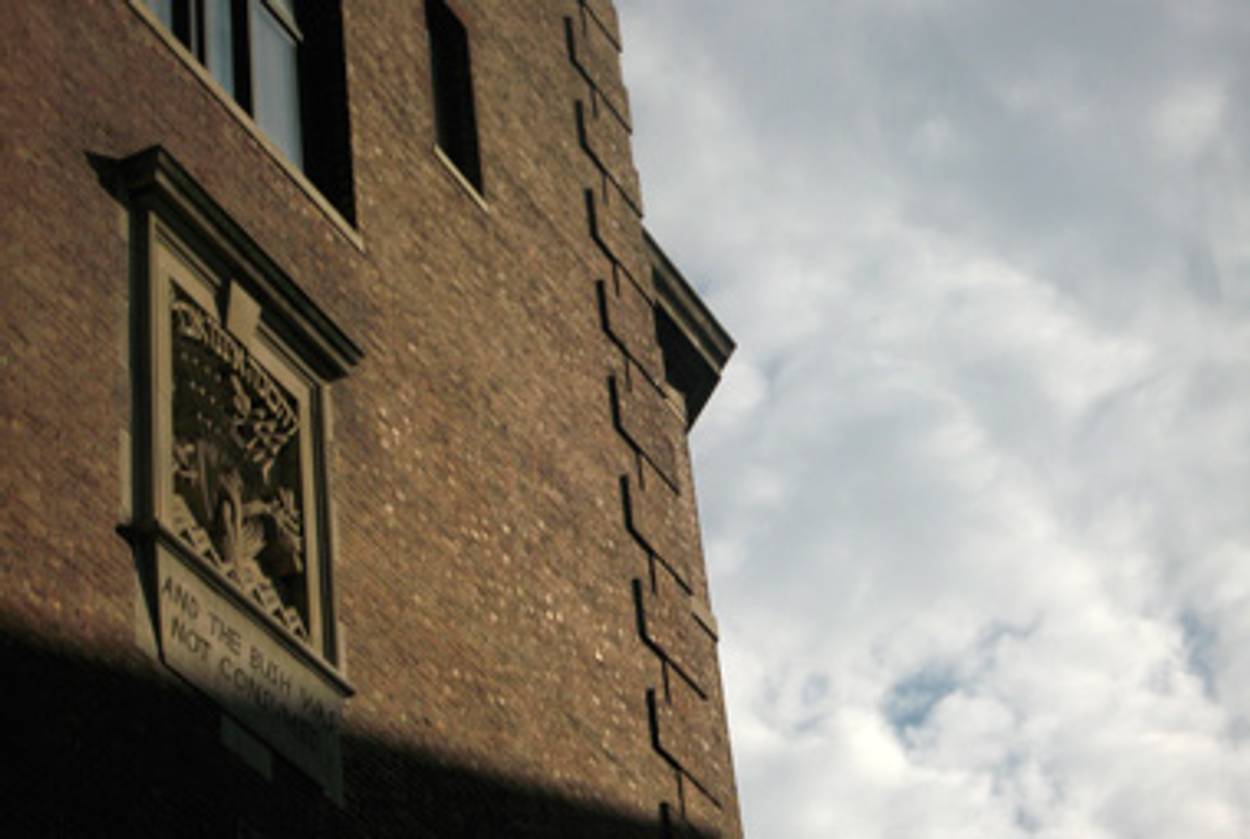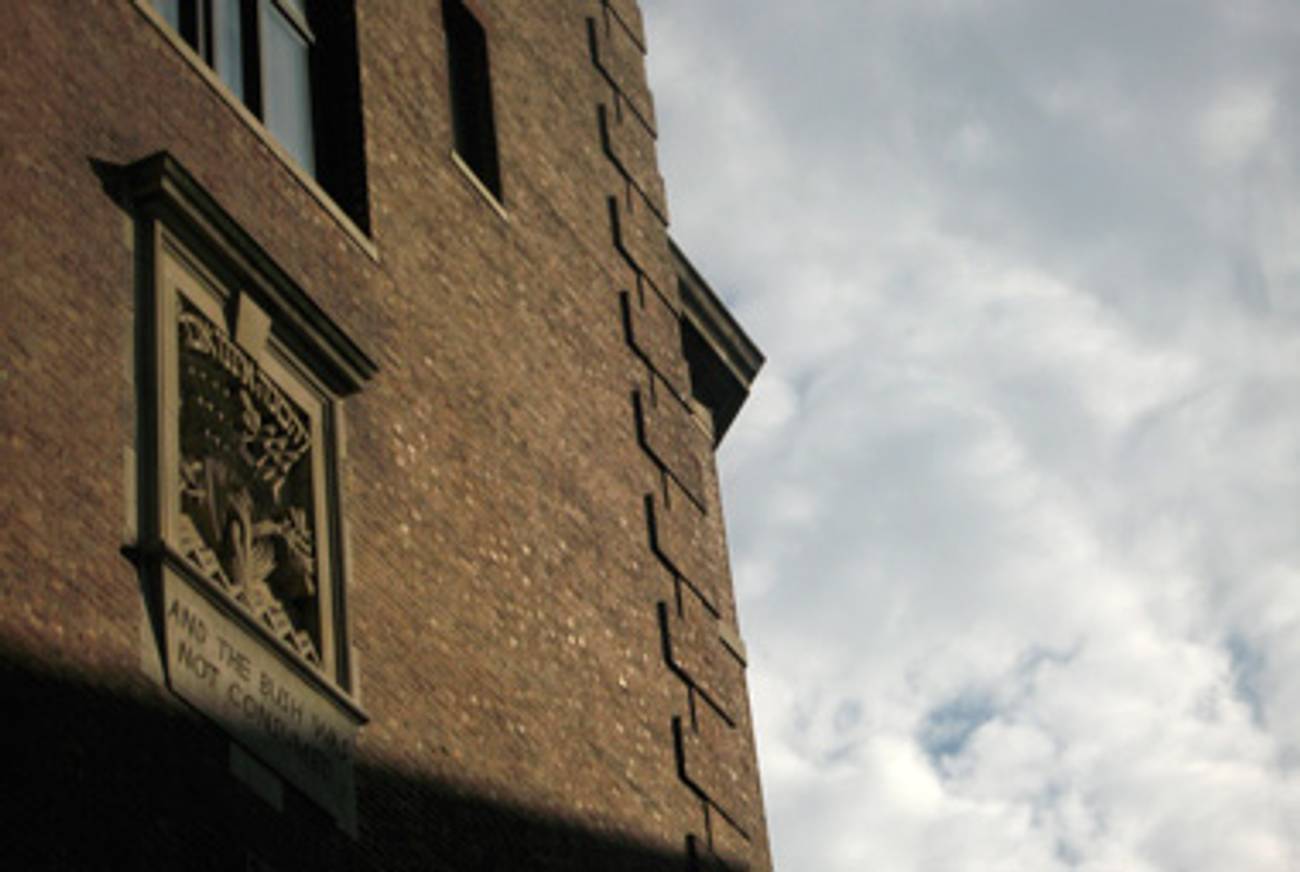Endnote
Amid financial shortfalls and a Conservative crisis, the Jewish Theological Seminary will shutter its cantorial school




As part of a major restructuring effort, the Jewish Theological Seminary announced last week that its cantorial school, traditionally separate from the rabbinical school, will be integrated into the rabbinical school. Henry Rosenblum, the well-regarded dean of the H.L. Miller Cantorial School, will be laid off. The move provoked an outcry from the seminary’s cantorial students, who fear that the shift will mean an end to the automony that they and their school previously enjoyed.
The shift comes at a delicate time for the institution and for the Conservative movement, for which it serves as spiritual incubator and intellectual home. The school is reportedly millions of dollars in debt. At the same time, the once-vibrant movement has seen a steady shrinking of its membership rolls and a parallel diminution in what sets it apart from Judaism’s Reform movement.
These tensions come to the fore in the institution of the cantorate. In the immediate postwar years, most Reform and Conservative congregations boasted a charismatic, operatic cantor, who sometimes even eclipsed the rabbi. Reform Judaism began a move away from this model toward more participatory services in the 1960s and ’70s. The Conservative movement has been caught in something of a bind: while it has more recently embraced the shift in an effort to lure a younger audience, doing so has served to further blur the line that divided it from the Reform movement.
On Monday afternoon, JTS chancellor Arnold Eisen met with a large, distraught group of students, alumni, and faculty to defend the de facto demotion of the cantorial school. While students complained about a lack of institutional transparency, Eisen reassured the assembly that the cantorial school would not be closing. Monday’s meeting may be the only student-administration faceoff in recent memory in which a polite student body prepared for the face-off with a “Solidarity Mincha,” or afternoon prayer service, and in which student leaders requested that the chancellor not only promise to give students more decision-making power, but that he ratify that promise by signing a covenant, or brit.
The reorganization did not come as a complete surprise. Faculty, if not yet students, got a whiff last year that big changes were ahead in the cantorial school. Last spring, the seminary’s board hired Jack Ukeles, a management consultant who often works with Jewish organizations, to develop a strategic plan for revamping the institution. The plan that Ukeles drafted a few months later advised shutting down the cantorial school altogether. Chancellor Eisen has stated repeatedly that he never even considered implementing that suggestion—and Provost Alan Cooper told Tablet Magazine that the changes now being announced have nothing to do with Ukeles’s report—but rumors nevertheless began to circulate.
“Everyone jumped to the worst possible conclusions after it came out,” said Alberto Mizrahi, a Miller School alumnus who is now a cantor at Anshe Emet Synagogue in Chicago and a frequent music coach at his alma mater. “Everyone has something to say: Are we going to close the school? Are we going to merge with Hebrew Union College?”
There’s no truth to the latter rumor either, the administration says, though cantorial students at JTS and HUC, the Reform movement seminary, last year began sharing some classes on musical technique.
While the faculty’s worst fears were not realized, they were reactivated Friday afternoon when students and professors were informed via an email from Eisen that “the position of dean of the H.L. Miller Cantorial School will no longer be part of the academic structure of JTS.” He further explained that the previously autonomous cantorial school will, as of this summer, fall under the same umbrella as the seminary’s larger rabbinical school, and will be supervised by the rabbinical school’s dean, Danny Nevins. It also announced, less controversially, that JTS’s graduate and undergraduate schools of academic Jewish studies will soon share a dean as well.
Shortly after the email was sent, Shabbat began, and for a strange 24 hours, everyone on the religiously observant campus was at least officially at rest. Once the Sabbath ended, though, cantorial students began feverishly posting alarmed status updates on their Facebook pages: one student was “very worried about the future of the North American Cantorate”; another ominously referenced the upcoming meeting with Eisen: “Crisis at JTS Cantorial School. Monday is the Day of Judgment.” Meanwhile, Cooper sent a memo that attempted to dispel the rumors about the cantorial school closing, merging with HUC, or being taken over by the rabbinical school. Though students say their worst fears have subsided, they are still—as student representatives said at Monday’s meeting—worried about being left out of the process, and devastated about the loss of their dean.
“JTS has always been the place for people who sought to maintain traditional nusach [musical style] in the service—to move forward and add contemporary music as well, but also to preserve some of the great pieces we have from the golden age of hazzanut [cantorial performance] when cantors were really something,” said Rebecca Platt, a second-year cantorial student. “Now I’m concerned about whether we’re going to be able to maintain that, without Henry and without a very autonomous program.”
The economic logic of the move goes beyond JTS’s budget deficit, said Andy Shugerman, a recent graduate of the JTS rabbinical school who now runs educational programs for the seminary in Florida and the South. Some small synagogues are cutting costs by hiring just one spiritual leader instead of a rabbi and a cantor. By making the boundary between rabbinic and cantorial training more fluid—teaching rabbis to lead a congregation in prayer and training cantors more extensively in halacha—JTS hopes it can make its alumni more marketable at a particularly vulnerable time.
The softening of that boundary could be a silver lining of Eisen’s plan, cantorial students said, and not just because of the dismal job market. Historically, relationships between rabbis and cantors have been rocky—JTS itself didn’t allow cantors to sleep in its dorms, which were for rabbinical students only, until the 1970s. “What might finally start happening is bringing together the rabbinical and cantorial schools, and that might be great,” said Yakov Hadash, a fourth-year cantorial student and the president of the Miller School’s student organization.
Eisen and Cooper have publicly framed the restructuring of the cantorial school as part of a philosophical shift toward a future model of the Conservative movement, a demonstration of just how far the pendulum has swung in Conservative circles away from traditional hazzanut. But outside the JTS administration, even those sympathetic to the plan see it as primarily an economic decision. “The school is in major financial trouble, and Henry Rosenblum, who is an old and dear friend of mine, is one of the statistics that happens in this world,” Alberto Mizrahi said.
It’s not yet known who will be hired as the new cantorial school director—a position that will encompass some duties of the erstwhile cantorial school dean but will be subsidiary to the rabbinical dean—and how long a search for that person will take place. Students in their first few years of the five-year cantorial program, Hadash said, are concerned about whether their academic lives will be thrown out of whack if they are temporarily leaderless—and that, if they don’t like the yet-to-be-appointed director, things might not improve.
Most of all, though, students are mourning Rosenblum’s departure; he held his position for 12 years and had, by all accounts, been an important mentor, advocate, and emotional support system for JTS students both in an out of the cantorial school. Said Platt, “Our hearts are collectively a little broken.”
With additional reporting by Jenny Merkin.
Marissa Brostoff, a doctoral student in English at the CUNY Graduate Center, is a former staff writer at Tablet and the Forward.
Ari M. Brostoff is Culture Editor at Jewish Currents.